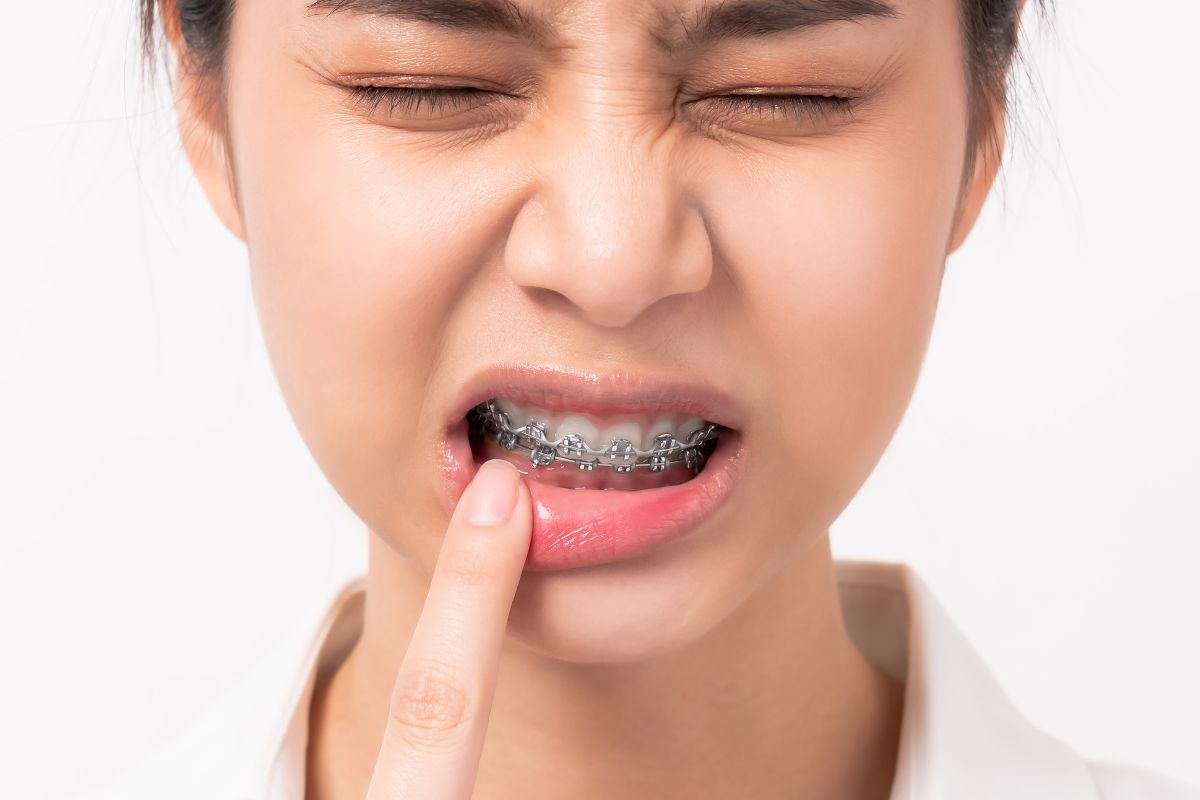Getting braces? Congrats, but let’s talk about the part no one loves: the pain. That tight, achy feeling after getting them on or adjusted is totally normal.
Most people feel discomfort for a few days, especially at the start. In this guide, we’ll explain how long braces pain usually lasts, why it happens, and simple ways to soothe it fast.
How long does braces pain last?
Brace pain typically lasts 3-5 days after getting them or after adjustments. It’s manageable, and the discomfort fades as your teeth adjust. Soft foods and pain relievers can help!
Key Takeaways
- Brace pain typically lasts a few days after an adjustment or when they are first put on.
- The pain is caused by pressure on your teeth, which is necessary for them to move into the desired position.
- There are various ways to manage the pain, including over-the-counter pain relief, ice packs, and soft foods.
Why Do Braces Cause Pain?

The discomfort from braces is primarily caused by the pressure applied to your teeth as they move into the correct position.
When your orthodontist tightens the wires or adjusts the braces, it puts pressure on the teeth and gums.
Over time, this pressure causes the teeth to shift, which is what results in the straighter smile you’re aiming for.
While necessary for the treatment to be effective, this pressure can be painful, especially after each adjustment or when you first get your braces.
Additionally, the brackets and wires can irritate the inside of your mouth, causing soreness along the gums, lips, and cheeks.
This irritation can contribute to the feeling of discomfort during the early stages of wearing braces.
How Long Does Braces Pain Last After Installation?
When you first get braces, the pain is typically more intense because your teeth and gums are adjusting to the new pressure.
The first few days after getting your braces installed can be uncomfortable, but this pain usually subsides after 3 to 5 days.
The initial discomfort is caused by the braces shifting your teeth into place, which can result in sore gums, aching teeth, and sensitivity.
It’s important to note that this pain is temporary and is part of the normal process of moving your teeth.
How Long Does Pain Last After Adjustments?
One of the most common sources of pain during braces treatment is the adjustment appointments.
Every few weeks, your orthodontist will tighten the braces or change the wires to ensure your teeth continue to shift as planned.
After these appointments, you may experience discomfort again, similar to the initial pain when you first got your braces.
Immediate Discomfort
Most people feel some discomfort immediately after their adjustment, which typically lasts for 24 to 48 hours.
Lingering Sensitivity
After the initial discomfort, you may still experience some lingering sensitivity for a few days, but it should gradually improve within a week.
In general, the pain after each adjustment appointment tends to decrease as your teeth become used to the pressure.
By the time you’re several months into your treatment, you may notice that the discomfort after adjustments is less intense.
How to Manage Brace Pain
While it’s natural to experience some pain during your braces treatment, there are several ways to manage the discomfort and make the process more bearable.
Over-the-Counter Pain Relief
For mild pain and discomfort, over-the-counter pain medications like ibuprofen (Advil) or acetaminophen (Tylenol) can help relieve the pain.
Be sure to follow the recommended dosage on the label and consult your orthodontist if you have any concerns about taking these medications.
Orthodontic Wax
Orthodontic wax can be a lifesaver when it comes to relieving pain caused by the brackets and wires rubbing against the inside of your mouth.
Simply take a small piece of the wax, roll it into a ball, and flatten it over any sharp areas of your braces.
This creates a barrier between your braces and your mouth, helping to reduce irritation and pain.
Cold Compress
Applying a cold compress to your cheeks or jaw can help reduce swelling and numb the area, offering temporary relief from pain.
Use an ice pack wrapped in a cloth and apply it to your face for 10 to 15 minutes at a time.
Eat Soft Foods
For the first few days after getting your braces or having an adjustment, try eating softer foods like soup, mashed potatoes, yogurt, and smoothies.
This will reduce the need to chew and help minimize discomfort. Avoid hard, chewy, or sticky foods, as these can irritate your braces and cause more pain.
Saltwater Rinses
Rinsing your mouth with warm salt water can help soothe sore gums and promote healing.
Dissolve half a teaspoon of salt in a cup of warm water and swish it around your mouth for 30 seconds to a minute. Repeat this process a few times a day.
Frequently Asked Questions (FAQs)
1. How long will it take for the pain from braces to go away?
The pain from braces typically lasts for 3 to 5 days after installation or adjustment. However, some sensitivity may persist for up to a week, gradually improving over time.
2. Can I eat normally with braces?
It’s best to stick to soft foods for the first few days after getting your braces or after an adjustment. Avoid hard or sticky foods that can cause pain or damage to the braces.
3. Is it normal for braces to hurt after each adjustment?
Yes, it’s normal to experience some discomfort after each adjustment. The pain usually subsides within 24 to 48 hours, but some sensitivity may last a few days.
Conclusion
While the pain associated with braces can be uncomfortable, it is generally short-lived and part of the process of achieving a straighter, healthier smile.
By following the tips mentioned above and using pain management techniques, you can alleviate discomfort and continue on your path toward a beautiful smile.
If you’re concerned about the pain or find that it’s not subsiding as expected, don’t hesitate to reach out to your orthodontist for advice and further assistance.
Remember, the temporary discomfort is a small price to pay for long-term results, and with proper care, you’ll be able to manage it effectively.
%202.svg)


